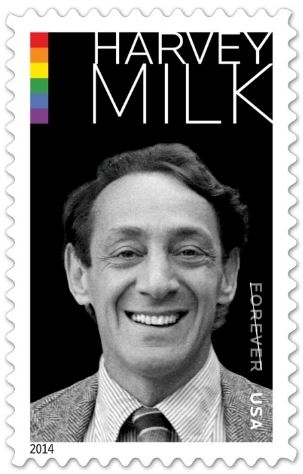Earlier this afternoon, I was stirred once again by the life of Harvey Milk when, surrounded by some his closest associates and beneficiaries of his legacy, I had the honor of attending the dedication of a U.S. postage stamp commemorating his life and work. The event was held at the White House.
It's a fitting honor for a man who embodied the very best of what America stands for -- community, equality, and the conviction that every person deserves a fair shot. Like Gus Van Sant's film Milk, starring Sean Penn, this stamp -- the first to feature an openly gay individual -- will bring Milk's story to a new generation of Americans who didn't live that history in real time. But for my generation, the original source that opened our eyes to Harvey Milk's greatness and inspired and instructed us was The Mayor of Castro Street: The Life and Times of Harvey Milk, Randy Shilts' 1982 biography of America's first openly gay politician.
I'm so grateful that my friend and colleague Mary Beth Maxwell, the department's principal deputy assistant secretary for policy, recommended The Mayor of Castro Street for our "Books that Shaped Work in America" project. I don't hesitate to rank Mary Beth among the true champions of Milk's legacy, and her recommendation is astute. But I wonder if the connection between this story of a man who found his calling organizing the disenfranchised gay community of San Francisco's Castro Street and the story of work, workers and workplaces in America is obvious to everyone.
For me, it's simple. Long before I entered the workforce and knew or understood his impact and importance, Harvey Milk was the first person I was aware of who was out at work. He refused to hide who he was. At a time when staying in the closet was the safest choice, he burst down its door. I learned that reading Randy Shilts' book.
Conformity defined the American workplace then (there are fascinating books on our list, like William Whyte's The Organization Man and Sloan Wilson's The Man in the Grey Flannel Suit that explore this). Milk's story showed me and millions like me that staying true to who we are leads to greater success than conforming to others' expectations. Milk's success in politics came because he could bring his whole self to his mission. Radical humanity and audacious visibility are the stuff of workplace leaders and trailblazers, not blemishes to cover up. That's a message that LGBT people still need to hear as they navigate the workplace. And that's why The Mayor of Castro Street is indeed a book that shaped work in America... and continues to do so today.
Milk's example serves not only the LGBT community, but empowers the men and women whose vision and individuality hold the potential to create new enterprises that transform our economy and increase our nation's prosperity. Think of Steve Jobs. Think of Alice Waters. Think of our Secretary of Commerce, Penny Pritzker.
"Hope will never be silent," Milk said. From his story, we learned that -- in life and at work -- neither should we.
Carl Fillichio heads the Labor Department's Office of Public Affairs.